Secrets of the Blue Zones
By Dr. Mehmet Oz
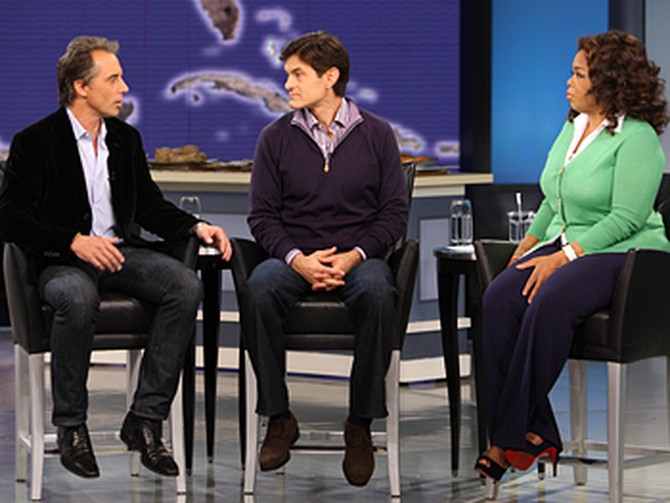
In most of the world, the prospect of living to age 100 sounds like a mixed blessing. While a long life is generally good, many people worry that it also equals diminished health and mental function. But that isn't so in the "blue zones."
In four hot spots around the globe, people live to 100 in great numbers. But it's not only about longevity—they live with strength, vitality and happiness. Residents of the blue zones regularly exercise, tend their gardens, are active members of their communities, eat delicious food and even have sex!
To find out what they're doing right—and we're doing wrong—Oprah and Dr. Oz look to Dan Buettner, a freelance writer for National Geographic who spent seven years researching his book The Blue Zones: Lessons for Living Longer from the People Who've Lived the Longest.
In four hot spots around the globe, people live to 100 in great numbers. But it's not only about longevity—they live with strength, vitality and happiness. Residents of the blue zones regularly exercise, tend their gardens, are active members of their communities, eat delicious food and even have sex!
To find out what they're doing right—and we're doing wrong—Oprah and Dr. Oz look to Dan Buettner, a freelance writer for National Geographic who spent seven years researching his book The Blue Zones: Lessons for Living Longer from the People Who've Lived the Longest.

The first blue zone on the list is Costa Rica's Nicoya Peninsula, a small region located about a two-hour trip on bumpy roads from the national capital of San Jose. Nicoya is the biggest blue zone on earth—home to literally hundreds of centenarians.
To see what makes the residents of the Nicoya Peninsula so vital, Dr. Oz and Dan paid a visit. There, they met 102-year-old Panchita, who still chops wood every day for cooking; 86-year-old Filippa, who sells her homemade tamales; and 95-year-old Serillo, who was cruising by on his bike as he visited with neighbors.
But to meet one of the oldest Nicoyans, Dan took Dr. Oz on a hike deep into the rainforest.
To see what makes the residents of the Nicoya Peninsula so vital, Dr. Oz and Dan paid a visit. There, they met 102-year-old Panchita, who still chops wood every day for cooking; 86-year-old Filippa, who sells her homemade tamales; and 95-year-old Serillo, who was cruising by on his bike as he visited with neighbors.
But to meet one of the oldest Nicoyans, Dan took Dr. Oz on a hike deep into the rainforest.
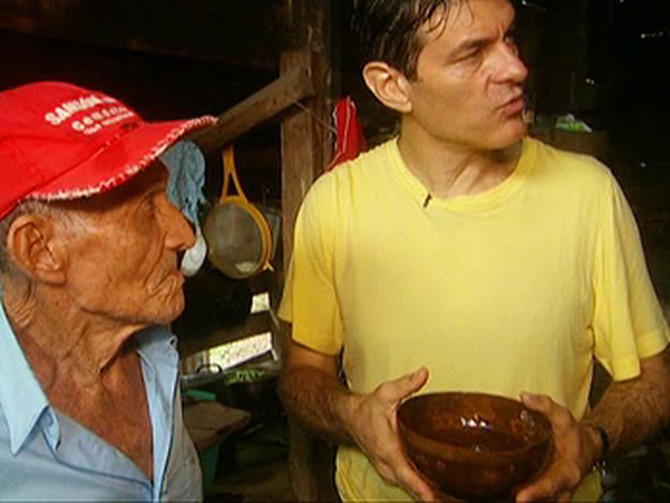
After hours of soggy trekking, Dan and Dr. Oz met Patrone—who says he's an astonishing 107 years old!
Dan says one of the secrets of Nicoyans' lifespan can be found in the water that flows through the hills. Their water is among the hardest in Costa Rica—which means it's chock-full of minerals. "Hard water means stronger bones. It also means your muscles are probably working better, especially when you get old," Dan says.
Dr. Oz says hard water has proven benefits. "Calcium, magnesium and water—it relaxes your arteries, it builds bone strength and it has a huge benefit across the board in how your body functions," he says.
Having strong bones is actually one of the most important ways to live a long life. "One of the biggest killers of older people in this country is simply falling down and breaking a bone," Dan says. "If you take calcium and couple it with vitamin D, your bones don't deteriorate as quickly."
To re-create the benefits of the Nicoyans' calcium-rich water, Dan suggests eating eggs and dairy. You can get calcium from other sources too, including leafy green vegetables like kale and broccoli.
Dan says one of the secrets of Nicoyans' lifespan can be found in the water that flows through the hills. Their water is among the hardest in Costa Rica—which means it's chock-full of minerals. "Hard water means stronger bones. It also means your muscles are probably working better, especially when you get old," Dan says.
Dr. Oz says hard water has proven benefits. "Calcium, magnesium and water—it relaxes your arteries, it builds bone strength and it has a huge benefit across the board in how your body functions," he says.
Having strong bones is actually one of the most important ways to live a long life. "One of the biggest killers of older people in this country is simply falling down and breaking a bone," Dan says. "If you take calcium and couple it with vitamin D, your bones don't deteriorate as quickly."
To re-create the benefits of the Nicoyans' calcium-rich water, Dan suggests eating eggs and dairy. You can get calcium from other sources too, including leafy green vegetables like kale and broccoli.

While visiting Patrone, Dan and Dr. Oz enjoyed a meal prepared by his 65-year-old daughter. Families stay together in Nicoya, which is another important key to living a long life.
For lunch, she made corn tortillas from scratch. First, she soaks the corn in ash and lime to break it down. Then, she smashes it in a metate—a Central American stone mortar. Then, she cooks the corn patties without oil. "It's a lot of hard work, and there's no electricity, so she can't do it any other way," Dr. Oz says. "And it's a good workout."
This daily process of cooking tortillas is like an automatic workout. "You know, most Americans don't really exercise. A very small proportion," Dan says. "But in Nicoya, they'll be making lunch and it's like doing 25 reps with the free weights."
For lunch, she made corn tortillas from scratch. First, she soaks the corn in ash and lime to break it down. Then, she smashes it in a metate—a Central American stone mortar. Then, she cooks the corn patties without oil. "It's a lot of hard work, and there's no electricity, so she can't do it any other way," Dr. Oz says. "And it's a good workout."
This daily process of cooking tortillas is like an automatic workout. "You know, most Americans don't really exercise. A very small proportion," Dan says. "But in Nicoya, they'll be making lunch and it's like doing 25 reps with the free weights."

Dan and Dr. Oz's next stop is the home of 99-year-old Jose, who tells them about his typical day. Jose says after breakfast he tends his garden and clears underbrush around his corn crops.
When he sees Jose squatting down and using a machete to cut weeds around his corn plants, Dr. Oz is dumbstruck. "He's whacking through this stuff better than any lawn mower you can buy. It's remarkable," he says. "I'm looking at a 99-year-old man doing a better job than I could taking out the underbrush here."
Dr. Oz asks to examine Jose further and finds that his daily chores have built up strong chest, stomach and leg muscles, which are crucial for aging well. Dr. Oz explains that the quadriceps—the large group of muscles on the front of the thigh—allow you to bend your hips and extend your knee and are crucial for walking. "If you can't walk a quarter-mile in five minutes, the chance that you'll be dead in three years is three times higher than if you can," he says. "It's a big deal."
One exercise you can do to strengthen the quadriceps is a basic squat. Make the motion of sitting in a chair, but don't sit all the way down. "Just go down close to it and get back up," Dr. Oz says.
For those who are too weak for this exercise, Dr. Oz recommends repeatedly sitting and standing in a chair without using the armrests. "It's simple things like that," he says. "And [the Nicoyans] make it part of their life."
When he sees Jose squatting down and using a machete to cut weeds around his corn plants, Dr. Oz is dumbstruck. "He's whacking through this stuff better than any lawn mower you can buy. It's remarkable," he says. "I'm looking at a 99-year-old man doing a better job than I could taking out the underbrush here."
Dr. Oz asks to examine Jose further and finds that his daily chores have built up strong chest, stomach and leg muscles, which are crucial for aging well. Dr. Oz explains that the quadriceps—the large group of muscles on the front of the thigh—allow you to bend your hips and extend your knee and are crucial for walking. "If you can't walk a quarter-mile in five minutes, the chance that you'll be dead in three years is three times higher than if you can," he says. "It's a big deal."
One exercise you can do to strengthen the quadriceps is a basic squat. Make the motion of sitting in a chair, but don't sit all the way down. "Just go down close to it and get back up," Dr. Oz says.
For those who are too weak for this exercise, Dr. Oz recommends repeatedly sitting and standing in a chair without using the armrests. "It's simple things like that," he says. "And [the Nicoyans] make it part of their life."
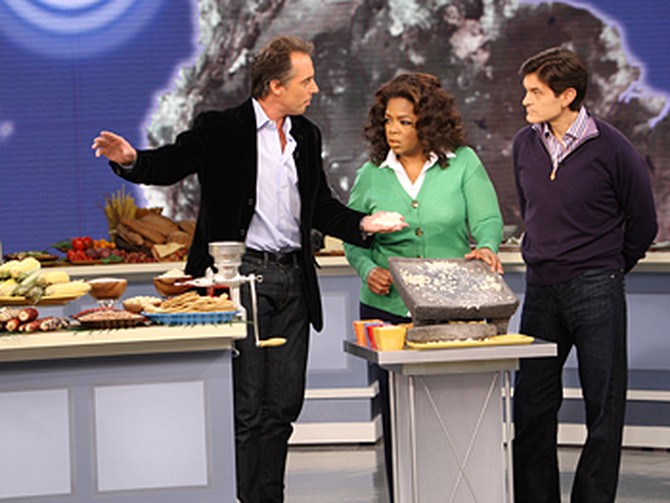
Another crucial factor to Nicoyan longevity is diet. On his land, Jose has 14 different kinds of trees that produce ripe fruit all year long.
But the real secret may be in what Dan calls the "Mesoamerican trifecta" that is the predominant diet in much of Central America—and has been for 3,500 years! The diet consists of lightly salted corn tortillas, beans and squash. "It's arguably the best longevity food ever invented," Dan says.
Another important aspect of the Nicoyan diet is that they tend to eat their larger meals in the morning, with progressively smaller meals throughout the day. This not only leaves Nicoyans craving fewer calories during the day, it also lets them transition into sleep much more easily when darkness falls. "A hundred years ago, when the sun went down, the brain would start making more melatonin. And with more melatonin, you'd get tired, you'd get drowsy," Dr. Oz says. "Today, the reason half of us don't sleep normally is because the last thing we see is a computer screen or the tube. That actually does the opposite to your brain—it stimulates it. So of course you can't fall asleep. You've got to glide to sleep."
But the real secret may be in what Dan calls the "Mesoamerican trifecta" that is the predominant diet in much of Central America—and has been for 3,500 years! The diet consists of lightly salted corn tortillas, beans and squash. "It's arguably the best longevity food ever invented," Dan says.
Another important aspect of the Nicoyan diet is that they tend to eat their larger meals in the morning, with progressively smaller meals throughout the day. This not only leaves Nicoyans craving fewer calories during the day, it also lets them transition into sleep much more easily when darkness falls. "A hundred years ago, when the sun went down, the brain would start making more melatonin. And with more melatonin, you'd get tired, you'd get drowsy," Dr. Oz says. "Today, the reason half of us don't sleep normally is because the last thing we see is a computer screen or the tube. That actually does the opposite to your brain—it stimulates it. So of course you can't fall asleep. You've got to glide to sleep."

The next stop on our blue zone tour is Sardinia, a Mediterranean island 120 miles off the coast of Italy. Here, you'll find the highest number of male centenarians in the world.
When Dan drops in on 105-year-old Giovanni, he's greeted with a glass of wine—at 10 a.m.! Then, to test his strength, Dan challenges Giovanni to arm wrestle—and loses.
Giovanni spent most of his life walking Sardinia's rocky terrain as a sheep herder. The low-impact exercise helps keep his heart strong, especially since a daily Sardinian hike through the mountains can burn up to 490 calories an hour.
What fuels Giovanni? "I eat bread, cheese and dark wine," he says.
When Dan drops in on 105-year-old Giovanni, he's greeted with a glass of wine—at 10 a.m.! Then, to test his strength, Dan challenges Giovanni to arm wrestle—and loses.
Giovanni spent most of his life walking Sardinia's rocky terrain as a sheep herder. The low-impact exercise helps keep his heart strong, especially since a daily Sardinian hike through the mountains can burn up to 490 calories an hour.
What fuels Giovanni? "I eat bread, cheese and dark wine," he says.
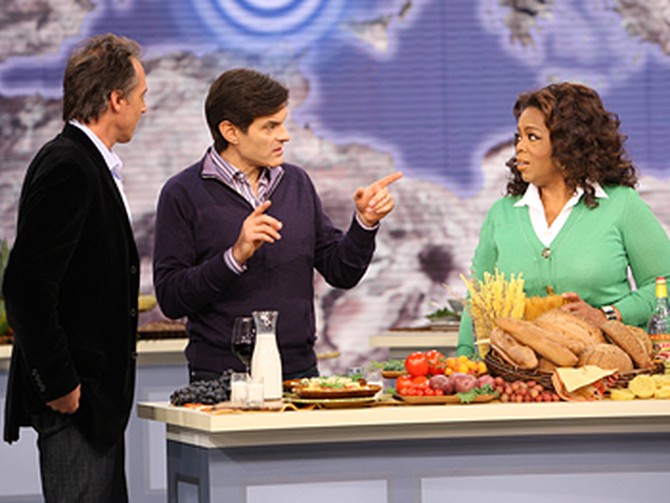
You don't have to travel to the Mediterranean to incorporate these age-defying delicacies into your diet. Planning a Sardinian menu? Start with eating a lean, plant-based diet and only have meat as a side dish.
One major staple? Dairy. "The pecorino cheese Sardinia is known for is rich in omega-3 fatty acids," Dr. Oz says. "Pecorino cheese is available in grocery stores, and if it's made from grass-fed cow's milk, you'll get an extra dose of omega-3.
Pair a hunk of cheese with a slice of whole grain bread, and you've got a Sardinian snack with some longevity. Another snack option? Sardines. "They've got omega-3s in them, key minerals and iron," Dr. Oz says.
Sardinians also drink goat's milk, which is high in calcium and good for your heart. "Plus, researchers believe it could protect against Alzheimer's and heart disease," Dr. Oz says.
Not only is goat's milk healthy, it's easier for your stomach to digest and is also good for people who are lactose intolerant. "It has tryptophan, that same sort of mellowing agent that turkey has," Dr. Oz says. "The fat particles in goat milk are much smaller than in cow milk, so you don't have to mix it up. And when you mix up fat globules, in some people it makes enzymes that irritate your stomach." Goat's milk is available in most grocery store dairy departments—just look for it in a smaller size than a gallon.
The Sardinians eat foods with a lot of color—which helps them get a healthy dose of vitamin D. "One thing the blue zones all seem to have is a lot of sun exposure. Of course, the sun gives you the vitamin D that we know is the single most important vitamin deficiency in America," Dr. Oz says. "The sun's doing what the fruits and vegetables are doing—they're protecting your insides."
One major staple? Dairy. "The pecorino cheese Sardinia is known for is rich in omega-3 fatty acids," Dr. Oz says. "Pecorino cheese is available in grocery stores, and if it's made from grass-fed cow's milk, you'll get an extra dose of omega-3.
Pair a hunk of cheese with a slice of whole grain bread, and you've got a Sardinian snack with some longevity. Another snack option? Sardines. "They've got omega-3s in them, key minerals and iron," Dr. Oz says.
Sardinians also drink goat's milk, which is high in calcium and good for your heart. "Plus, researchers believe it could protect against Alzheimer's and heart disease," Dr. Oz says.
Not only is goat's milk healthy, it's easier for your stomach to digest and is also good for people who are lactose intolerant. "It has tryptophan, that same sort of mellowing agent that turkey has," Dr. Oz says. "The fat particles in goat milk are much smaller than in cow milk, so you don't have to mix it up. And when you mix up fat globules, in some people it makes enzymes that irritate your stomach." Goat's milk is available in most grocery store dairy departments—just look for it in a smaller size than a gallon.
The Sardinians eat foods with a lot of color—which helps them get a healthy dose of vitamin D. "One thing the blue zones all seem to have is a lot of sun exposure. Of course, the sun gives you the vitamin D that we know is the single most important vitamin deficiency in America," Dr. Oz says. "The sun's doing what the fruits and vegetables are doing—they're protecting your insides."

Another secret to the Sardinians' long lives? Red wine. "It's actually polyphenols, which is a type of artery-scrubbing antioxidant. We actually had this wine tested. It has three times the level of antioxidants than any other wine," Dan says.
Dr. Oz says 90 percent of the benefit of wine is because of its alcohol. The other 10 percent is because it's got an antioxidant called resveratrol.
But the real benefits of drinking wine—red or white—aren't nutritional. "Wine happens at 5 at night when you get together with your friends. It happens with your family. And it's as much the ritual and doing it a little bit every day," Dan says. "They say people who drink two glasses of wine a day outlive those people who don't drink any. But you can't save up and drink 14 on Saturday."
Living like a Sardinian means putting family first and celebrating those in your closest social circles. Studies show that people who live in healthy families suffer lower rates of depression, suicide and stress. "The biggest determiner of how long you live is who you hang out with. If your three best friends are overweight, there's a 50 percent better chance that you'll be overweight yourself," Dan says.
Dr. Oz says 90 percent of the benefit of wine is because of its alcohol. The other 10 percent is because it's got an antioxidant called resveratrol.
But the real benefits of drinking wine—red or white—aren't nutritional. "Wine happens at 5 at night when you get together with your friends. It happens with your family. And it's as much the ritual and doing it a little bit every day," Dan says. "They say people who drink two glasses of wine a day outlive those people who don't drink any. But you can't save up and drink 14 on Saturday."
Living like a Sardinian means putting family first and celebrating those in your closest social circles. Studies show that people who live in healthy families suffer lower rates of depression, suicide and stress. "The biggest determiner of how long you live is who you hang out with. If your three best friends are overweight, there's a 50 percent better chance that you'll be overweight yourself," Dan says.

Home to the longest-living Americans is Loma Linda, California, a town 60 miles east of Los Angeles.
A big part of life in Loma Linda revolves around faith—it's home to 9,000 followers of the Seventh Day Adventist church. The Christian religion emphasizes diet and health and frowns on smoking, drinking and eating meat and processed foods.
Heart surgeon Ellsworth Wareham is a 94-year-old Adventist who can still be found in the operating room. "I think it's important for an individual to have some security and peace in his life. And I get that from believing in a loving, caring God, you see. And so if he's in charge of my life, why sit around and worry? I mean, he takes care of the universe, he can certainly take care of me, so I don't worry."
Dr. Wareham also follows a vegan diet, which means he doesn't eat any meat, milk or eggs. He also spends about 10 hours a week working in his garden. "I've been fortunate, first, but I do try to follow a good lifestyle," he says.
A big part of life in Loma Linda revolves around faith—it's home to 9,000 followers of the Seventh Day Adventist church. The Christian religion emphasizes diet and health and frowns on smoking, drinking and eating meat and processed foods.
Heart surgeon Ellsworth Wareham is a 94-year-old Adventist who can still be found in the operating room. "I think it's important for an individual to have some security and peace in his life. And I get that from believing in a loving, caring God, you see. And so if he's in charge of my life, why sit around and worry? I mean, he takes care of the universe, he can certainly take care of me, so I don't worry."
Dr. Wareham also follows a vegan diet, which means he doesn't eat any meat, milk or eggs. He also spends about 10 hours a week working in his garden. "I've been fortunate, first, but I do try to follow a good lifestyle," he says.
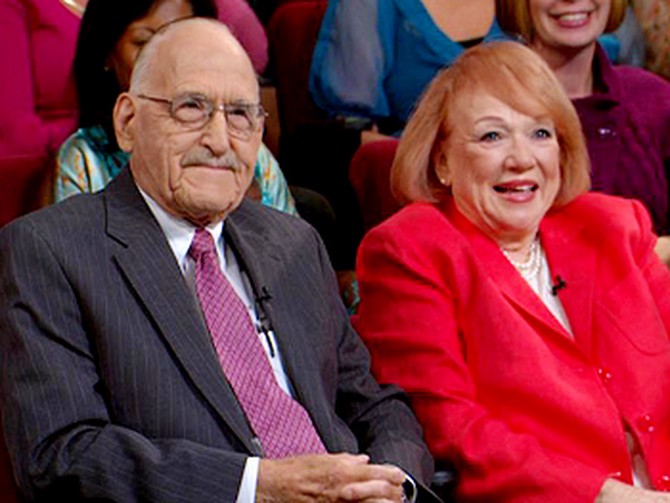
Dr. Wareham has been taking patients into the operating room since before Dr. Oz was born. To learn more of his secrets of longevity, Dr. Oz scrubs in with Dr. Wareham, who's glad to have him. "I think that if you're old, you should keep away from old people. And keep with young people, you see," Dr. Wareham says. "If I can keep around fellas like you, I'll be invigorated for days from having met you."
Having performed more than 12,000 operations in his life, Dr. Wareham credits his passion for work with keeping him healthy. "I doubt if my health would be as good as it is now," he says. "And I am fearful to change anything I'm doing because I'm not only alive, but I feel good. I'm not taking any medications."
But it may not be the work that's keeping Dr. Wareham healthy. It's more about a sense of purpose, Dr. Oz says. Dan says people in most blue zones don't even have a word for retirement. "Before you retire, knowing what your values are, knowing what your gifts are and where to share those gifts. That's a great investment," Dan says.
Not even Barbara, Dr. Wareham's wife of 58 years, wants him to retire. "People ask me that a lot and I just say, 'Leave him alone. He's happy,'" she says. "I don't think he'd be nearly so happy just sitting at home."
As seen in Nicoya and Sardinia, strong relationships are also key to a long life. So what's the secret of the Warehams' marriage? "Don't try to change them," Dr. Wareham says. "We all have different backgrounds, and we have different genes. Let the person be who they are."
Having performed more than 12,000 operations in his life, Dr. Wareham credits his passion for work with keeping him healthy. "I doubt if my health would be as good as it is now," he says. "And I am fearful to change anything I'm doing because I'm not only alive, but I feel good. I'm not taking any medications."
But it may not be the work that's keeping Dr. Wareham healthy. It's more about a sense of purpose, Dr. Oz says. Dan says people in most blue zones don't even have a word for retirement. "Before you retire, knowing what your values are, knowing what your gifts are and where to share those gifts. That's a great investment," Dan says.
Not even Barbara, Dr. Wareham's wife of 58 years, wants him to retire. "People ask me that a lot and I just say, 'Leave him alone. He's happy,'" she says. "I don't think he'd be nearly so happy just sitting at home."
As seen in Nicoya and Sardinia, strong relationships are also key to a long life. So what's the secret of the Warehams' marriage? "Don't try to change them," Dr. Wareham says. "We all have different backgrounds, and we have different genes. Let the person be who they are."
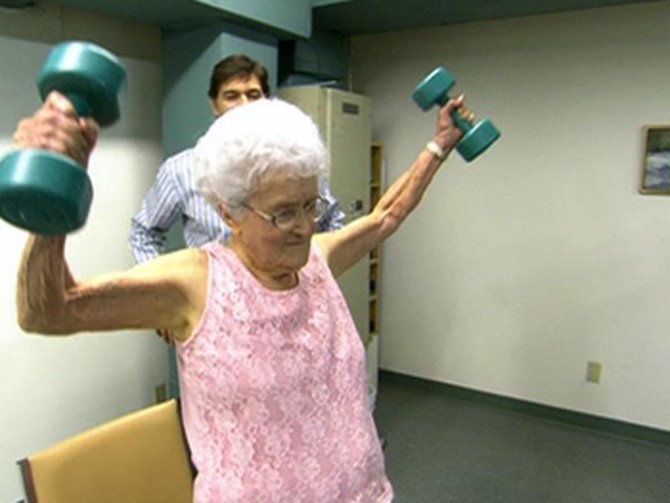
While investigating the longevity of the Loma Lindans, Dan had the pleasure of meeting 103-year-old Marge Jetton. Marge's secret to staying healthy is daily exercise and volunteerism.
Marge's daily exercise routine consists of weight lifting and riding a stationary bicycle for 7 or 8 miles at 25 mph! "You know, it's impressive," Dr. Oz says. "Most folks watching this program I don't think can go 25 miles an hour." While Marge demonstrates her dumbbell workout, Dr. Oz notices how strong her arms look. "They're very big. This is priceless," Dr. Oz says. "She's pumping iron."
After 77 years of marriage, Marge's husband passed away. As most people would do, Marge mourned her loss, but then realized that there was more for her to do. "She said, 'I realized the world is not going to come to me. I need to go to the world,'" Dan says. "And she still volunteers for seven organizations at 103. So it's a sign of being healthy."
Marge's daily exercise routine consists of weight lifting and riding a stationary bicycle for 7 or 8 miles at 25 mph! "You know, it's impressive," Dr. Oz says. "Most folks watching this program I don't think can go 25 miles an hour." While Marge demonstrates her dumbbell workout, Dr. Oz notices how strong her arms look. "They're very big. This is priceless," Dr. Oz says. "She's pumping iron."
After 77 years of marriage, Marge's husband passed away. As most people would do, Marge mourned her loss, but then realized that there was more for her to do. "She said, 'I realized the world is not going to come to me. I need to go to the world,'" Dan says. "And she still volunteers for seven organizations at 103. So it's a sign of being healthy."
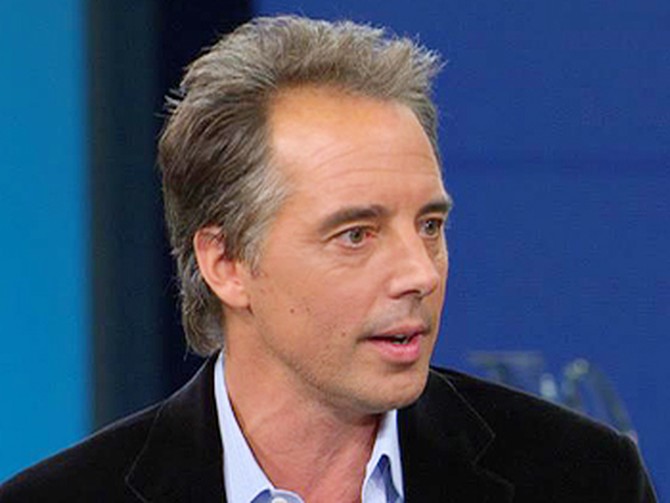
While many residents of Loma Linda may keep healthy by eating well, exercising and volunteering, another aspect that might be overlooked is religion. Nine-thousand Loma Lindans—about half of the town's population—are members of Seventh Day Adventist Church, which emphasizes a very strict observance of the sabbath. "For 24 hours every week no matter how stressed out, no matter where the kids need to be driven to, they stop everything," Dan says. "From Friday night until Saturday night, they focus on their God, their family, their community."
Dan believes that being a member of a community where everyone has the same values can add quality years to your life. Dr. Oz says that showing gratitude is another reason why people in these communities have such long and healthy lives. "If you're grateful for the things that have always happened to you, sometimes they're not always good, but you find lessons and meaning in them," Dr. Oz says. "Hope isn't about a good outcome. It's about making sense of stuff. And these people have made sense of their life, and they do it all the time."
Dan believes that being a member of a community where everyone has the same values can add quality years to your life. Dr. Oz says that showing gratitude is another reason why people in these communities have such long and healthy lives. "If you're grateful for the things that have always happened to you, sometimes they're not always good, but you find lessons and meaning in them," Dr. Oz says. "Hope isn't about a good outcome. It's about making sense of stuff. And these people have made sense of their life, and they do it all the time."
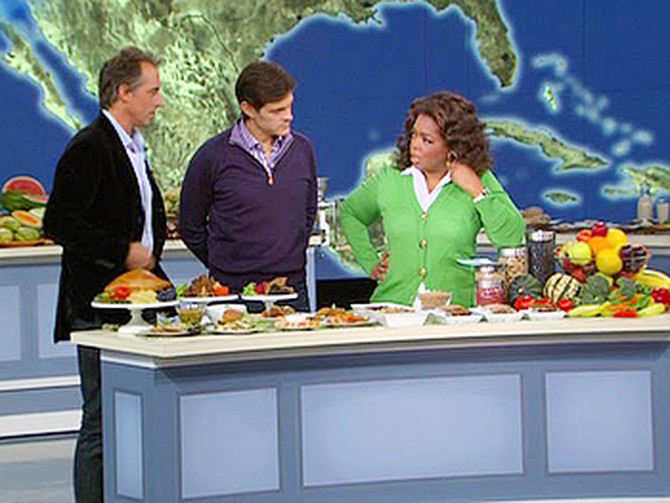
When Dr. Oz and Dan went into a grocery store in Loma Linda, they said it was easy to see why their community has lived such long and healthy lives. "It's full of bins of locally grown beans and nuts," Oprah says. "And aisles of fresh fruits and vegetables.
Normally, eating healthy is thought to be expensive, but the price of foods are relatively inexpensive in Loma Linda because most of their beans and nuts are locally grown and because of how they package the foods. "They sold these in big bins so you didn't pay a lot of money for marketing and for packaging," Dr. Oz says. "It just was the bin."
Get vegan and vegetarian recipes straight from Loma Linda.
Because so many residents of Loma Linda are vegans, there is no meat or dairy in their diets, which Dan believes contributes to their health. "You can eat meat, but ... keep it as a sideshow," he says.
Normally, eating healthy is thought to be expensive, but the price of foods are relatively inexpensive in Loma Linda because most of their beans and nuts are locally grown and because of how they package the foods. "They sold these in big bins so you didn't pay a lot of money for marketing and for packaging," Dr. Oz says. "It just was the bin."
Get vegan and vegetarian recipes straight from Loma Linda.
Because so many residents of Loma Linda are vegans, there is no meat or dairy in their diets, which Dan believes contributes to their health. "You can eat meat, but ... keep it as a sideshow," he says.
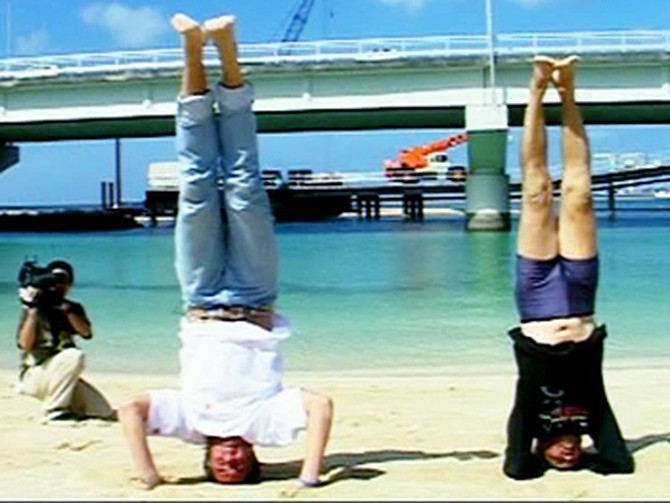
The Japanese island of Okinawa is another zone in which people live long and healthy lives. "Okinawans live a good seven years longer than Americans," Dr. Oz says. "And they suffer about 80 percent fewer heart attacks and cancer than people in the U.S."
The Okinawans attribute their health and longevity to a couple of words, ikigai and moai. Ikigai means "that which makes one's life worth living." Moai means that one has a social support network. "Having lifelong friends is key to shedding stress," Dr. Oz says. Daily exercise and gardening are a few ways in which 84-year-old Fumiyasa Yomikawa gets his ikigai.
The Okinawans attribute their health and longevity to a couple of words, ikigai and moai. Ikigai means "that which makes one's life worth living." Moai means that one has a social support network. "Having lifelong friends is key to shedding stress," Dr. Oz says. Daily exercise and gardening are a few ways in which 84-year-old Fumiyasa Yomikawa gets his ikigai.

The Okinawan diet is made up of tofu, vegetables and fish. But a ritual they do before each meal also contributes to their health. "Okinawans recite 'hara hachi bu,'" Dr. Oz says. "[It's] an adage that reminds them to stop eating when they're 80 percent full."
"Hara hachi bu. That's what I need to do," Oprah says. "And how do you know when you're 80 percent full?"
"Well, the reality is, and many of you have experienced this, if you eat what you normally eat in a meal, you'll feel really full about 15, 20 minutes later," Dr. Oz says. "The only way to really know you're going to be 80 percent full is to stop eating way before you think you're going to be full."
More health secrets from Dr. Oz, America's Doctor
"Hara hachi bu. That's what I need to do," Oprah says. "And how do you know when you're 80 percent full?"
"Well, the reality is, and many of you have experienced this, if you eat what you normally eat in a meal, you'll feel really full about 15, 20 minutes later," Dr. Oz says. "The only way to really know you're going to be 80 percent full is to stop eating way before you think you're going to be full."
More health secrets from Dr. Oz, America's Doctor
Published 11/18/2008
As a reminder, always consult your doctor for medical advice and treatment before starting any program.

